- Home
- Alice Munro
Dear Life Page 5
Dear Life Read online
Page 5
When he called “Ready,” and I opened the door, I was armed with this new skepticism.
I said, “Who do you agree with, Naphta or Settembrini?”
“I beg your pardon?”
“In The Magic Mountain. Do you like Naphta best or Settembrini?”
“To be honest, I’ve always thought they were a pair of windbags. You?”
“Settembrini is more humane but Naphta is more interesting.”
“They tell you that in school?”
“I never read it in school,” I said coolly.
He gave me a quick look, the eyebrow raised.
“Pardon me. If there’s anything in there that interests you, feel free. Feel free to come down here and read in your time off. There’s an electric heater I could set up, since I imagine you are not experienced with woodstoves. Shall we think about that? I can rustle you up an extra key.”
“Thank you.”
Pork chops for supper, mashed potatoes, canned peas. Dessert was an apple pie from the bakery, which would have been better if he had thought to heat it up.
He asked me about my life in Toronto, my university courses, my grandparents. He said that he supposed I had been brought up on the straight and narrow.
“My grandfather is a liberal clergyman sort of in the Paul Tillich mode.”
“And you? Liberal little Christian granddaughter?”
“No.”
“Touché. Do you think I’m rude?”
“That depends. If you are interviewing me as an employer, no.”
“So I’ll go on. Do you have a boyfriend?”
“Yes.”
“In the forces I suppose.”
I said, In the Navy. That struck me as a good choice, accounting for my never knowing where he was and not getting regular letters. I could manage that he did not get shore leave.
The doctor got up and fetched the tea.
“What sort of boat is he on?”
“Corvette.” Another good choice. After a while I could have him torpedoed, as was always happening to corvettes.
“Brave fellow. Milk or sugar in your tea?”
“Neither one thanks.”
“That’s good because I haven’t got any. You know it shows when you’re lying, you get hot in the face.”
If I hadn’t got hot before I did then. My flush rose from my feet up and sweat trickled down under my arms. I hoped the dress would not be ruined.
“I always go hot when I drink tea.”
“Oh I see.”
Things could not get any worse so I resolved to face him down. I changed the subject on him, asking about how he operated on people. Did he remove lungs, as I had heard?
He could have answered that with more teasing, more superiority—possibly his notion of flirtation—and I believed that if he had done so I would have put on my coat and walked out into the cold. And perhaps he knew that. He began to talk about thoracoplasty, and explain that it was, however, not so easy on the patient as collapsing and deflating a lung. Which interestingly enough even Hippocrates had known about. Of course removal of the lobe had also become popular recently.
“But don’t you lose some?” I said.
He must have thought it was time to joke again.
“But of course. Running off and hiding in the bush, we don’t know where they get to—Jumping in the lake—Or did you mean don’t they die? There’s cases of things not working. Yes.”
But great things were coming, he said. The surgery he went in for was going to become as obsolete as bloodletting. A new drug was on the way. Streptomycin. Already used in trial. Some problems, naturally there would be problems. Toxicity of the nervous system. But there would be a way found to deal with that.
“Put the sawbones like me out of business.”
He washed the dishes, I dried. He put a dish towel round my waist to protect my dress. When the ends were efficiently tied he laid his hand against my upper back. Such firm pressure, fingers separated—he might almost have been taking stock of my body in a professional way. When I went to bed that night I could still feel that pressure. I felt it develop its intensity from the little finger to the hard thumb. I enjoyed it. That was more important really than the kiss placed on my forehead later, the moment before I got out of his car. A dry-lipped kiss, brief and formal, set upon me with hasty authority.
* * *
The key to his house showed up on the floor of my room, slipped under the door when I wasn’t there. But after all I couldn’t use it. If anybody else had made me this offer I would have jumped at the chance. Especially if it included a heater. But in this case his past and future presence would be drawing all ordinary comfort out of the situation and replacing it with a pleasure that was tight and nerve-racking rather than expansive. I would not be able to stop shivering even when it wasn’t cold, and I doubted whether I could have read a word.
I thought that Mary would probably appear, to scold me for missing Pinafore. I thought of saying that I had not been well. I’d had a cold. But then I remembered that colds in this place were a serious business, involving masks and disinfectant, banishment. And soon I understood that there was no hope of hiding my visit to the doctor’s house, in any case. It was a secret from nobody, not even, surely, from the nurses who said nothing, either because they were too lofty and discreet or because such carryings-on had ceased to interest them. But the aides teased me.
“Enjoy your supper the other night?”
Their tone was friendly, they seemed to approve. It looked as if my particular oddity had joined up with the doctor’s familiar and respected oddity, and that was all to the good. My stock had risen. Now, whatever else I was, I at least might turn out to be a woman with a man.
Mary did not put in an appearance all week.
* * *
“Next Saturday,” were the words that had been said, just before he administered the kiss. So I waited again on the front porch and this time he was not late. We drove to the house and I went into the front room while he got the fire going. There I noticed the dusty electric heater.
“Didn’t take me up on my offer,” he said. “Did you think I didn’t mean it? I always mean what I say.”
I said that I hadn’t wanted to come into town for fear of meeting Mary.
“Because of missing her concert.”
“That’s if you’re going to arrange your life to suit Mary,” he said.
The menu was much the same as before. Pork chops, mashed potatoes, corn niblets instead of peas. This time he let me help in the kitchen, even asking me to set the table.
“You may as well learn where things are. It’s all fairly logical, I believe.”
This meant that I could watch him working at the stove. His easy concentration, economical movements, setting up in me a procession of sparks and chills.
We had just begun the meal when there was a knock at the door. He got up and drew the bolt and in burst Mary.
She was carrying a cardboard box which she set on the table. Then she threw off her coat and displayed herself in a red-and-yellow costume.
“Happy late Valentine’s Day,” she said. “You never came to see me in the concert so I brought the concert to you. And I brought you a present in the box.”
Her excellent balance allowed her to stand on one foot while she kicked off first one boot, then the other. She pushed them out of her way and began to prance around the table, singing at the same time in a plaintive but vigorous young voice.
I’m called Little Buttercup,
Poor Little Buttercup,
Though I can never tell why.
But still I’m called Buttercup
Poor Little Buttercup
Dear Little Buttercup I—
The doctor had got up even before she began to sing. He was standing at the stove, busy scraping at the frying pan that had held the pork chops.
I applauded. I said, “What a gorgeous costume.”
It was indeed. Red skirt, bright yellow petticoat, flutt
ering white apron, embroidered bodice.
“My mom made it.”
“Even the embroidery?”
“Sure. She stayed up till four o’clock to get it done the night before.”
There was further whirling and stomping to show it off. The dishes tinkled on the shelves. I applauded some more. Both of us wanted only one thing. We wanted the doctor to turn around and stop ignoring us. For him to say, even grudgingly, one polite word.
“And lookit what else,” Mary said. “For a Valentine.” She tore open the cardboard box and there were Valentine cookies, all cut in heart shapes and plastered with thick red icing.
“How splendid,” I said, and Mary resumed her prancing.
I am the Captain of the Pinafore.
And a right good captain, too!
You’re very, very good, and be it understood,
I command a right good crew.
The doctor turned at last and she saluted him.
“All right,” he said. “That’s enough.”
She ignored him.
Then give three cheers, and one cheer more
For the hardy captain of the Pinafore—
“I said, that’s enough.”
“‘For the gallant captain of the Pinafore—’”
“Mary. We are eating supper. And you are not invited. Do you understand that? Not invited.”
She was quiet at last. But only for a moment.
“Well pooh on you then. You’re not very nice.”
“And you could just as well do without any of those cookies. You could quit eating cookies altogether. You’re on the way to getting as plump as a young pig.”
Mary’s face was swollen as if she would start to cry but instead she said, “Look who’s talking. You got one eye crooked to the other.”
“That’s enough.”
“Well you have.”
The doctor picked up her boots and set them down in front of her.
“Put these on.”
She did so, with her eyes full of tears and her nose running. She snuffled mightily. He brought her coat and did not help her as she flailed her way into it and found the buttons.
“That’s right. Now—how did you get here?”
She refused to answer.
“Walked, did you? Where’s your mother?”
“Euchre.”
“Well I can drive you home. So you won’t get any chance to fling yourself in a snowbank and freeze to death out of self-pity.”
I did not say a word. Mary did not look at me once. The moment was too full of shock for good-byes.
When I heard the car start I began clearing the table. We had not got to dessert, which was apple pie again. Perhaps he did not know of any other kind, or perhaps it was all the bakery made.
I picked up one of the heart-shaped cookies and ate it. The icing was horribly sweet. No berry or cherry flavor, just sugar and red food coloring. I ate another and another.
I knew that I should have said good-bye at least. I should have said thank you. But it wouldn’t have mattered. I told myself it wouldn’t have mattered. The show had not been for me. Or perhaps only a small part of it had been for me.
He had been brutal. It shocked me, that he had been so brutal. To one so much in need. But he had done it for me, in a way. So that his time with me should not be taken away. This thought flattered me and I was ashamed that it flattered me. I did not know what I would say to him when he got back.
He did not want me to say anything. He took me to bed. Had this been in the cards all along, or was it almost as much of a surprise to him as it was to me? My state of virginity at least did not appear to be a surprise—he provided a towel as well as a condom—and he persisted, going as easily as he could. My passion could have been the surprise to us both. Imagination, as it turned out, might be as good a preparation as experience.
“I do intend to marry you,” he said.
Before he took me home he tossed all the cookies, all those red hearts, out in the snow to feed the winter birds.
So it was settled. Our sudden engagement—he was a little wary of the word—was a private settled fact. I was not to write a word to my grandparents. The wedding would take place whenever he could get a couple of consecutive days off. A bare-bones wedding, he said. I was to understand that the idea of a ceremony, carried on in the presence of others, whose ideas he did not respect, and who would inflict on us all that snickering and simpering, was more than he was prepared to put up with.
Nor was he in favor of diamond rings. I told him that I had never wanted one, which was true, because I had never thought about it. He said that was good, he had known that I was not that idiotic conventional sort of girl.
It was better to stop having supper together, not just because of the talk but because it was hard to get enough meat for two people on one ration card. My card was not available, having been handed over to the kitchen authorities—to Mary’s mother—as soon as I began to eat at the San.
Better not to call attention.
Of course everybody suspected something. The elderly nurses turned cordial and even Matron gave me a pained smile. I did preen in a modest way, almost without meaning to. I took to folding myself in, with a velvet stillness, eyes rather cast down. It did not quite occur to me that these older women were watching to see what turn this intimacy might take and that they were ready to turn righteous if the doctor should decide to drop me.
It was the aides who were wholeheartedly on my side, and teased that they saw wedding bells in my tea leaves.
The month of March was grim and busy behind the hospital doors. It was always the worst month for trouble to strike, the aides said. For some reason people took it into their heads to die then, after making it through the attacks of winter. If a child did not show up for class I would not know if there had been a major turn for the worse or just a bedding-down with a suspicion of a cold. I had got hold of a moveable blackboard and had written the children’s names all around the edges of it. Now I never even had to wipe off the names of the children whose absences were to be prolonged. Other children did it for me, without a mention. They understood the etiquette which I had still to learn.
Time was found, however, for the doctor to make some arrangements. He slipped a note under the door of my room, saying to be ready by the first week of April. Unless there was some real crisis, he could manage a couple of days then.
We are going to Huntsville.
Going to Huntsville—our code for getting married.
We have begun the day that I am sure I will remember all my life. I have my green crepe dry-cleaned and rolled up carefully in my overnight bag. My grandmother once taught me the trick of tight rolling, so much better than folding to prevent wrinkles. I suppose I will have to change my clothes in a ladies’ toilet somewhere. I am watching to see if there are any early wildflowers along the road, that I could pick to make a bouquet. Would he agree to my having a bouquet? But it’s too early even for marsh marigolds. Along the empty curving road nothing is to be seen but skinny black spruce trees and islands of spreading juniper and bogs. And in the road cuts a chaotic jumble of the rocks that have become familiar to me here—bloodstained iron and slanting shelves of granite.
The car radio is on and playing triumphal music, because the Allies are getting closer and closer to Berlin. The doctor—Alister—says that they are delaying to let the Russians in first. He says they’ll be sorry.
Now that we are away from Amundsen I find that I can call him Alister. This is the longest drive we have ever taken together and I am aroused by his male unawareness of me—which I know now can quickly shift to its opposite—and by his casual skill as a driver. I find it exciting that he is a surgeon though I would never admit that. Right now I believe I could lie down for him in any bog or mucky hole, or feel my spine crushed against any roadside rock, should he require an upright encounter. I know too that I must keep these feelings to myself.
I turn my mind to the future. Once we get
to Huntsville I expect that we will find a minister and stand side by side in a living room which will have some of the modest gentility of my grandparents’ apartment, of the living rooms I have known all my life. I recall times when my grandfather would be sought out for wedding purposes even after his retirement. My grandmother would rub a little rouge on her cheeks and take out the dark blue lace jacket that she kept for being a witness on such occasions.
But I discover there are other ways to get married, and another aversion of my bridegroom’s that I hadn’t grasped. He won’t have anything to do with a minister. In the Town Hall in Huntsville we fill out forms that swear to our single state and make an appointment to be married by a justice of the peace later in the day.
Time for lunch. Alister stops outside a restaurant that could be a first cousin to the coffee shop in Amundsen.
“This’ll do?”
But on looking into my face he does change his mind.
“No?” he says. “Okay.”
We end up eating lunch in the chilly front room of one of the genteel houses that advertise chicken dinners. The plates are icy cold, there are no other diners, there is no radio music but only the clink of our cutlery as we try to separate parts of the stringy chicken. I am sure he is thinking that we might have done better in the restaurant he suggested in the first place.
Nonetheless I have the courage to ask about the ladies’ room, and there, in cold air even more discouraging than that of the front room, I shake out my green dress and put it on, repaint my mouth and fix my hair.
When I come out Alister stands up to greet me and smiles and squeezes my hand and says I look pretty.
We walk stiffly back to the car, holding hands. He opens the car door for me, goes around and gets in, settles himself and turns the key in the ignition, then turns it off.
The car is parked in front of a hardware store. Shovels for snow removal are on sale at half price. There is still a sign in the window that says skates can be sharpened inside.
Across the street there is a wooden house painted an oily yellow. Its front steps have become unsafe and two boards forming an X have been nailed across them.

 Runaway
Runaway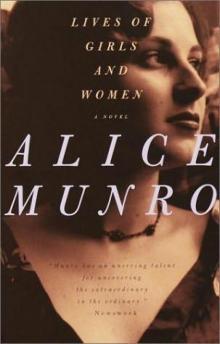 Lives of Girls and Women
Lives of Girls and Women Dance of the Happy Shades
Dance of the Happy Shades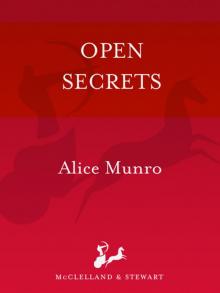 Open Secrets
Open Secrets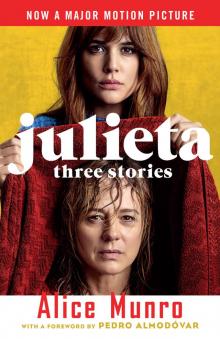 Julieta (Movie Tie-in Edition)
Julieta (Movie Tie-in Edition)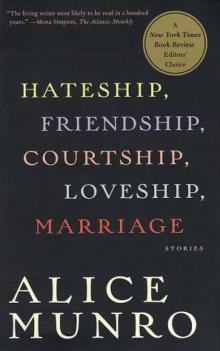 Hateship, Friendship, Courtship, Loveship, Marriage: Stories
Hateship, Friendship, Courtship, Loveship, Marriage: Stories Alice Munro's Best
Alice Munro's Best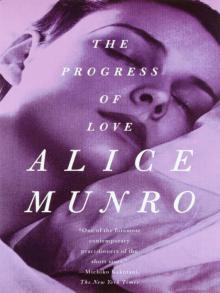 The Progress of Love
The Progress of Love Selected Stories
Selected Stories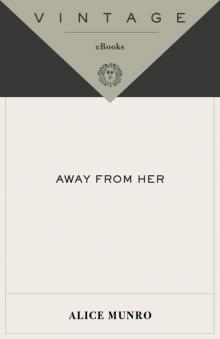 Away from Her
Away from Her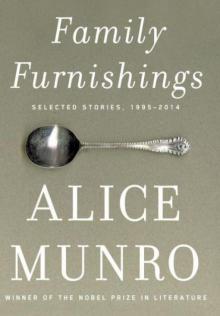 Family Furnishings
Family Furnishings Moons of Jupiter
Moons of Jupiter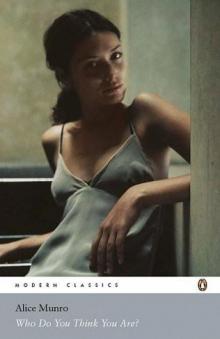 Who Do You Think You Are?
Who Do You Think You Are? Hateship, Friendship, Courtship, Loveship, Marriage
Hateship, Friendship, Courtship, Loveship, Marriage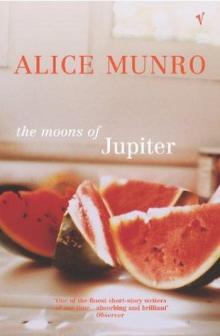 The Moons of Jupiter
The Moons of Jupiter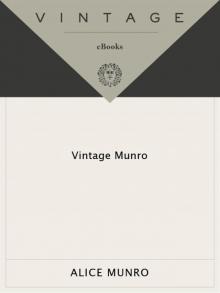 Vintage Munro
Vintage Munro The Love of a Good Woman
The Love of a Good Woman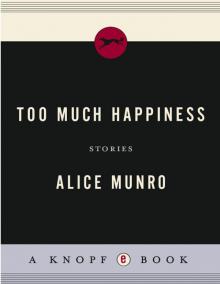 Too Much Happiness
Too Much Happiness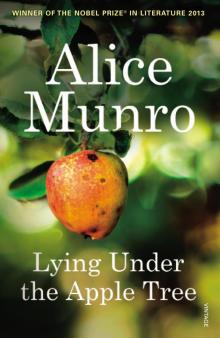 Lying Under the Apple Tree
Lying Under the Apple Tree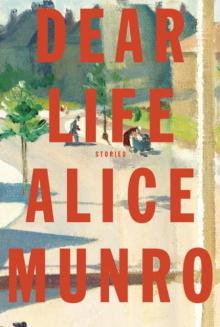 Dear Life
Dear Life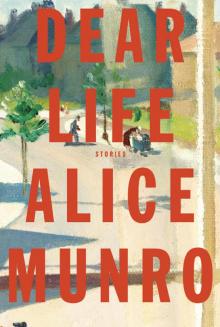 Dear Life: Stories
Dear Life: Stories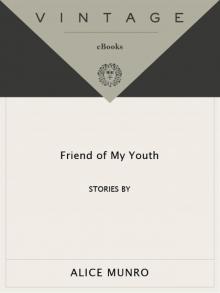 Friend of My Youth
Friend of My Youth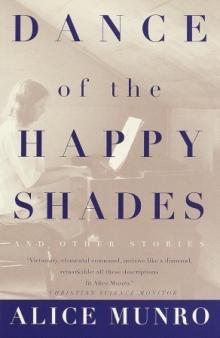 Dance of the Happy Shades: And Other Stories
Dance of the Happy Shades: And Other Stories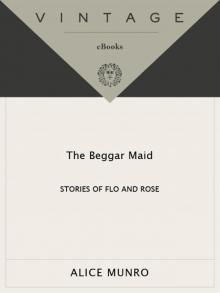 The Beggar Maid
The Beggar Maid